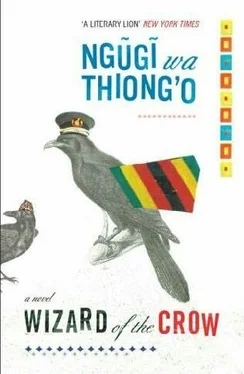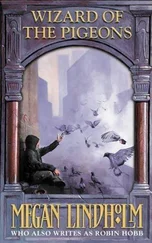“You have heard for yourselves,” the Wizard of the Crow now said to Vinjinia. “Daemons of whiteness took possession of your husband the night he brought home these three bags of money. You remember how you told me that it was after he counted the money that he rested his legs on the table and closed his eyes? That was the evil hour! As he looked into the future, he suddenly realized that at the rate the money was coming in he would end up being the richest man in Africa, and the only thing missing to distinguish him from all the other black rich was white skin. He saw his skin as standing between him and the heaven of his desire. When he scratched his face, daemons within were urging him to break ranks with blackness and enter into union with whiteness. In short, he suffers from a severe case of white-ache.”
Tajirika kept nodding to signal agreement with every word of the diagnosis. He was happy and relieved, because even before he came into that kind of money he had always borne the burden of self-hatred but had managed to suppress it. Now, thanks to the affliction and to Vinjinia, who’d brought him here, this sorcerer had managed to make him own up to it. Before today he had not had anybody with whom to share his secret, but now he felt as if those present were witnesses to his coming pact with his white destiny.
But soon he fell into a deep depression. People did not become white or black; they were born so. His was an unattainable desire, and to yearn for the unattainable to the point of paralysis was indeed an illness that might plague him for the rest of his life.
“And what is the cure for white-ache?” Vinjinia asked, happy that her husband had given voice to his desires, and fearful that the malady might return.
Tajirika awaited the answer, and, thinking the Wizard of the Crow too slow in his response, added to his wife’s plea: “What is the cure?” he asked.
“Tajirika, you know about smallpox.”
“A terrible disease, that one, a scourge. Almost wiped out black people at the end of the nineteenth century. In some ways it was worse than the current virus of death. Quite infectious, and there was no way of avoiding it. Except through good luck. Thank God it is no more.”
“How was it conquered?”
“Through mass vaccination.”
“Exactly. Inoculating people with the germs of smallpox. The same with tuberculosis. Tajirika, have you ever fried bacon?”
“Eggs, sausages, and bacon are my morning favorites for breaking my nightly fasts,” Tajirika said. “But of course it is my wife who cooks them.”
“What oil does she use for frying the bacon?”
“Mr. Wizard of the Crow, don’t make me laugh. Have you not heard the saying that a pig is fried with its own fat? But tell me, what has smallpox, tuberculosis, and pig’s meat got to do with white-ache?”
“Use the disease against itself! Become white!”
Tajirika could not believe his ears. Here he was, depressed by the realization that he could never become white no matter how wealthy he became, and here was this sorcerer, saying that there was actually a way to whiteness. That the impossible could be made possible!
“How?” he asked doubtfully after recovering from the pleasant shock. “I hope you are not thinking of a skin transplant?”
“Oh, no, it’s far simpler and less painful than that,” said the Wizard of the Crow. “Becoming white is actually quite simple, but it calls for work, hard work.”
“Say no more-the shoe fits,” Tajirika said now, abandoning himself to his joy at this unexpected turn in the tide of his earthly fortune, for he would kill two birds with one stone: cure his white-ache and become white. “Mr. Wizard of the Crow, tell me how to become white. I am ready to do what is needed. And when the deed is done, whatever you may want from me is yours to command.”
“First, help me solve a riddle!” said the Wizard of the Crow.
“Go ahead!”
“What is the first thing that tells who a person is?”
“The color of one’s skin.”
“No, Tajirika. Let’s go back to history. When African people were taken as slaves across the Atlantic Ocean in the sixteenth, seventeenth, and eighteenth centuries, what was the very first thing that the whites took away from the New World Africans?”
“I don’t know,” said Tajirika, wondering what slavery in centuries past had to do with what they had been talking about.
“Okay. Let me ask you another question. When children are born, what do their fathers and mothers give them to distinguish them from others?”
“Names?”
“Exactly. So what did the white slavers do to their black slaves? Took away their original names to make them over into what they wanted them to be. Are you with me?”
“Yes, Mr. Wizard of the Crow.”
“So to become white you must first give up your name. And, unlike those Africans who were forced to do so, you must give yours up willingly. Become a willing slave.”
“That is not such a big deal. Tajirika is out!” Tajirika wondered why the Wizard of the Crow had said that becoming white required work. And then?”
“Slaves were forced to take on the names of their owners. But you are lucky, Tajirika, because you have the freedom to choose from among thousands of European names.”
“That is even easier. I have already got one. Titus,” he said proudly, as if he had been on the right path all along.
“Titus? Mmm, let’s see. Do you know where it comes from? I mean, to whom it points?”
“No.”
“What’s come over you, Titus, forgetting your religion?” Vinjinia interjected suddenly. “Don’t you know that Titus was a convert and helper of St. Paul? Paul even wrote him a letter, Epistle to Titus?”
“Oh, is that where the name comes from?” Tajirika said.
“There was also another Titus,” said the Wizard of the Crow. “Titus Flavius Vespasianus. Roman emperor. In the construction business, like you. Completed the Colosseum in Rome. Emperor and saint. Not bad, a name that carries both.”
“But this emperor and this saint, were they white?” Tajirika asked in a tone tinged with doubt.
“Yes,” said the Wizard of the Crow.
“So Titus is white!” said Tajirika, now happy again.
“But it has been tarnished by its years of contact with your African Tajirika,” said Vinjinia.
“Yes. Go for a name that you think best points to the whiteness of your dreams. Freedom of choice. Choose what you want to be. Do you follow me?”
“Yes, Mr. Wizard of the Crow.”
“Now, Titus,” the Wizard of the Crow suddenly called out in a commanding tone, “what is your name? What is your new name in full?”
“Clement Clarence Whitehead,” said Tajirika, as proud as a peacock. “What next?” he asked, rubbing his hands together.
“A slave first loses his name, then his language. So, Mr. Clement Clarence Whitehead, you now know what to do next. Your language. Give it up.”
Gone!
“Then start speaking English like a white man.”
“That I have already started doing,” Tajirika assured the Wizard of the Crow, and he started drawling out a couple of sentences: Hi! Give mefi! I am Clement Clarence Whitehead…
“No, no, not American, Mr. Whitehead. The so-called American English has been completely contaminated by Black English, or what they now call Ebonics.”
“Blame it on the cheap American TV we watch. They are ruining our tongue. I don’t want Ebonics-I want the real thing. I swear that from now on I will keep on trying to perfect my English tongue. It is not easy and it will need much practice.”
“You have spoken well,” said the Wizard of the Crow. “Nothing comes from nothing.”
“I have what it takes. Next?” Tajirika asked a trifle impatiently, ready to leap over the remaining steps to whiteness.
Читать дальше












